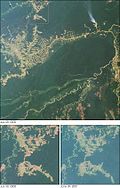
Deforestation is the single largest environmental issue in Brazil, and has been for the past few decades. Brazil once had the highest deforestation rate in the world and as of 2005 still has the largest area of forest removed annually. Since 1970, over 600,000 square kilometers (232,000 square miles) of Amazon rainforest have been destroyed. By the end of the 1980s the problem had become such a global issue not only with loss of the biodiversity and ecological disruption caused by removal of the forests but due to heavy emissions carbon dioxide released from its burning in the forest in Brazil and the loss of a valuable sink to absorb global carbon dioxide (CO2) emissions.
At the 1992 UN Framework Convention on Climate Change deforestation in Brazil became a major concern at the Summit in Rio de Janeiro where in collaboration with various environmental groups working in the region to give the Brazilian government an incentive to reduce forest removal and curb the rate of deforestation. By 2005 forest removal had fallen to 9,000 km2 (3,475 square miles) of forest compared to 18,000 km2 (6,950 square miles) in 2003